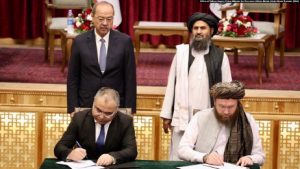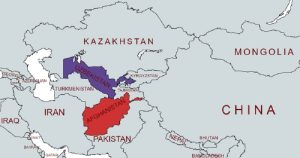Media Enquiries
For media inquiries contact:
+1 202 429 9500
Uzbekistan Bets on Taliban Success
October 21, 2024
Global Insights Hub
Download Arcanum Pulse report.
Long at the vanguard of normalizing relations with the Taliban, Uzbekistan signed $2.5 billion worth of trade and investment deals with Afghanistan’s de facto government on August 17, sending a clear signal of its faith in the longevity of Taliban rule. The 35 memoranda of understanding (MoUs) signed by Uzbek and Taliban leaders on August 17 represent the culmination of years of diplomatic outreach driven by both economic and security interests. The new MoUs – valued at $1.4 billion in investment and $1.1 billion in trade – cover the “agriculture, energy, infrastructure, and manufacturing sectors” and aim to lay the groundwork for bilateral trade to eventually reach up to $3 billion per year. Uzbekistan, which does not recognize the Taliban government but also never designated the Taliban as a terrorist organization, opened dialogue with the group soon after the fall of Kabul in August 2021.
- The deal represents a huge windfall for Kabul, which in 2019 had less than $10 billion in annual external trade and a GDP of about $15 billion – a figure that declined by about 20 percent in the year following the Taliban takeover.
- Uzbekistan’s prime minister – who led the Uzbek delegation to sign the deal – was the highest-ranking foreign dignitary to have entered Afghanistan since August 2021. He signed the agreement with the Taliban’s deputy prime minister Abdul Ghani Baradar rather than supreme leader, Haibatullah Akhundzada, who tends to delegate foreign policy matters.
- Uzbekistan has also opened a free economic zone at its border with Afghanistan, which will preserve 40 percent of its space for Afghan businesses and aims to generate about $1.2 billion in trade per year.
The steady normalization of ties between Tashkent and Kabul appears to have received tacit approval from the US, which has few direct avenues for engaging with the Taliban. On August 26 (just two weeks after Uzbekistan’s deal with the Taliban), the US agreed to transfer to Uzbek control 46 American military aircraft that had been flown to Uzbekistan by Afghan pilots fleeing the Taliban takeover in 2021, suggesting a lack of at least public concern in Washington DC with the burgeoning relationship.
- Though the Taliban is still designated as a Foreign Terrorist Organization by the US Government, US sanctions do not prohibit even Americans from trading with Afghanistan, and the Biden administration has reportedly weighed cooperation with the Taliban to track ISIS-K.
- Tashkent accepted the diplomatic credentials of the Taliban ambassador on October 10, and has probably lobbied other countries to show greater recognition of its legitimacy.
Uzbekistan favors the Taliban in its conflict with the Islamic State-Khorasan Province (ISIS-K), which, unlike the Taliban, has global ambitions and therefore poses a greater threat to Tashkent’s interests. Though 96 percent of Uzbekistan’s population is Muslim, Tashkent inherited a Soviet hostility towards religion and continues to repress political Islam at home, making it a potential target of transnational terror organizations such as the Islamic State.
- ISIS-K has conducted cross-border rocket attacks on Uzbek military and civilian targets, and Tashkent is probably concerned that greater freedom of action in Afghanistan could give ISIS-K more bandwidth to pursue its transnational agenda. Tashkent has played down the threat, denying that an April 2022 cross-border rocket strike on the city of Termez even took place, but Uzbekistan’s border with Afghanistan makes it vulnerable to such attacks as well as weapons trafficking and therefore terror attacks inside Uzbekistan, from which ISIS recruited 1,500-2,500 fighters for its campaigns in Iraq and Syria.
- In this context, Uzbekistan’s foreign minister Abdulaziz Kamilov declared in February 2022 – less than six months after the collapse of the Afghan Republic – that the Taliban “is doing very much to cleanse the country of terrorists,” adding that Tashkent should “encourage and support” the Taliban’s efforts “to integrate into regional and international economic communities.”
- The risk of damage to foreign-backed projects in Afghanistan is high, as counter-terrorism experts believe that both economic warfare and attacks on international presence have become key pillars of ISIS-K’s strategy against the Taliban.
Several countries other than Uzbekistan—such as Russia, China, and Kazakhstan—have made some efforts to develop economic ties with the Taliban but have proceeded cautiously due to the considerable risks of investing in Afghanistan. Uzbekistan probably believes there are risks from inaction, and that by taking this significant step it can contribute to regional security and position itself to reap the benefits of Afghanistan’s latent economic potential. Rich in natural resources from oil and gas to copper, gold, and uranium, Afghanistan’s vast mineral deposits could be worth more than $3 trillion if fully developed.
- Despite a relatively small GDP of only $80.39 billion in 2022 – about 225 times smaller than China’s – Uzbekistan’s latest gamble represents the largest investment in Afghanistan since the collapse of the US-backed Afghan Republic.
- Meanwhile, Russia has invited Taliban delegations to the St Petersburg Economic Forum since 2022 and sold Afghanistan some energy and food products, allegedly reaching $1 billion in bilateral trade this year, while Kazakh exports to Afghanistan are also at around $500 million to $1 billion a year.
- Despite its vast economy and long-term interests in Afghanistan (contributing 79 percent of foreign investment in Afghanistan in 2013), China has invested only about $1 billion since the Taliban took over, including a $540 million contract for oil extraction in the Amu Darya basin and a $49 million project to develop oil fields near Herat, which allegedly helped Afghanistan reach 8,000 barrels of crude oil production per day as of June 10. In April 2023, the Taliban claimed that a Chinese company was interested in investing $10 billion in lithium extraction, though a deal does not seem to have materialized. In Q1 2024, China claims to have exported almost $300 million worth of goods to Afghanistan, but imported only $7 million, despite lifting tariffs on 98 percent of Afghan products in December 2022.
There are some indications that Tashkent’s bet could pay off, though Afghanistan’s future development is likely to remain severely handicapped by Taliban rule. The Taliban has failed to develop real state institutions, and its ideological dogmatism – aside from the country’s instability – will probably continue to thwart much of the international technical and financial support that could help unlock Afghanistan’s potential. In August, the Taliban began enforcing one of the most draconian religious codes that banned women from raising their voices, from reciting the Koran in public, and from looking at men in public who are not their husbands, among other acts that severely limited the rights of women in Afghanistan.
- The Taliban has often chosen ideological purity over economic pragmatism – not only in its continued affiliations with Al Qaeda and policies towards women, but also in its decision to ban poppy farming without an effective replacement, worsening the poverty of millions of Afghans.
- Moreover, Taliban hardliners— like supreme leader Akhundzada —have effectively consolidated their power in the group (including via intimidation tactics such as executions and floggings) making a moderation of its policies unlikely for the foreseeable future, and limiting the potential for cooperation with many countries. Some members of the Taliban leadership, such as Interior Minister Sirajuddin Haqqani, are still calling for the Taliban to make itself more appealing to Afghans and the international community by moderating its policies, but there is so far little to suggest that they are achieving success.
- Despite its continued dogmatism, the Taliban’s legitimacy amongst non-Western countries appears to be growing: since August, the UAE, Kazakhstan, and Uzbekistan have accepted the diplomatic credentials of a Taliban ambassador – the only countries to take this step other than China, which recognized the Taliban envoy in December 2023.
Download Arcanum Pulse report.


